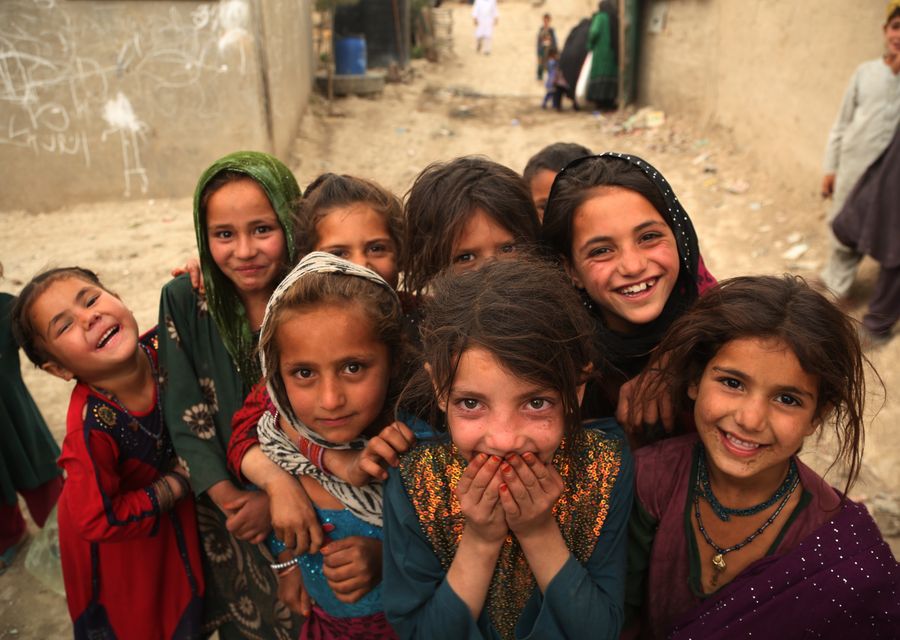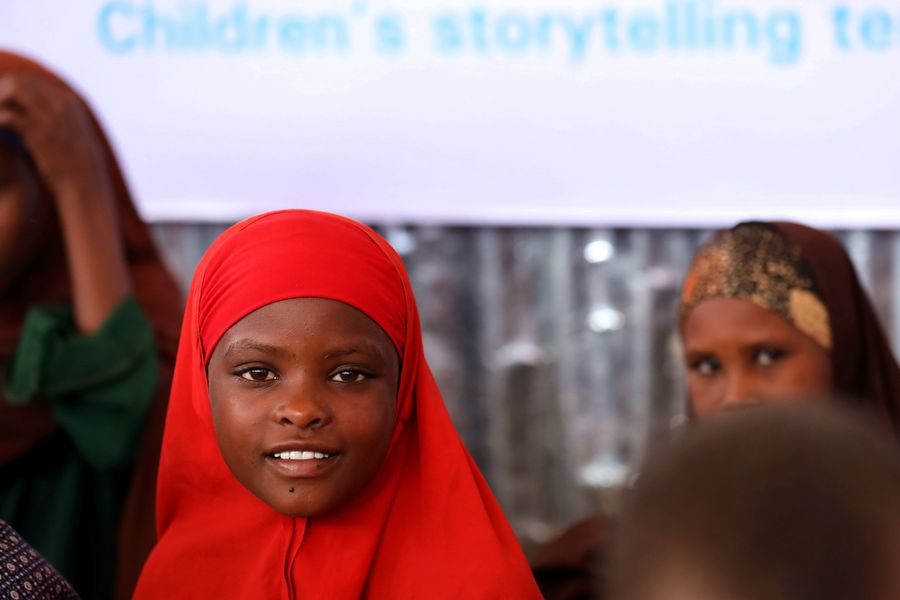
Afghan displaced children pose for photos at a makeshift camp in Kabul, Afghanistan, June 20, 2019. (Xinhua/Rahmat Alizadah)
More than 75 million children and young people aged 3-18 are currently in urgent need of educational support in 35 crisis-affected countries.
by Xinhua writer Wang Jiangang
UNITED NATIONS, Sept. 1 (Xinhua) -- "If you are the parent of a refugee child, having been running across the front lines with only a bag of clothes for years, do you aspire to end the suffering and transform your child's life? The only way out is education," Yasmine Sherif, director of Education Cannot Wait (ECW), the first global fund dedicated to education in emergencies and protracted crisis, said in a recent interview with Xinhua.
"It is only education that can keep conflicts at bay and bring lasting peace to the world," said Sherif, a legendary United Nations female official who is using her passion, unique and rich experience and extensive connections to help millions of vulnerable children and youth in countries and regions affected by conflicts and natural disasters.
Having served for 30 years in some of the most conflict-affected areas, including Afghanistan, the Democratic Republic of the Congo, Sudan and across the Middle East, Sherif said she was convinced that quality education for children and youth in crisis is key to unlocking the Agenda for Humanity, a five-point plan that outlines the changes that are needed to alleviate suffering, reduce risk and lessen vulnerability on a global scale, and the 2030 Agenda for Sustainable Development and its 17 Sustainable Development Goals (SDGs).

A child listens to stories at Alternative Basic Education (ABE) School at Hafata camp for the displaced located in Baidoa, Somalia on Sept. 8, 2018. (Xinhua/Wang Teng)
"It's worrisome that more than 75 million children and young people aged 3-18 are currently in urgent need of educational support in 35 crisis-affected countries," said Sherif, stone-faced.
"These pre-school to 18-year-old children and youth are our opportunity," she said. "If we fail them, with a population more than that of Thailand, then we will fail all our aspirations that we have."
"The United Nations has been going all out to achieve the SDGs. Is it possible that the global community can achieve these goals with such a huge population left far behind in education?" she said, while drawing a huge question mark in the air.
"Thanks to my years of working experience in crisis-affected countries and regions, I understand so well the sufferings and aspirations of refugee families and other people in urgent need of help," said Sherif.

Combo photo shows children walking home on a road after school on May 10, 2019 (L) and children climbing ladders to go home on a mountain road on July 4, 2012 in Nongyong Village of Bansheng Township in Dahua Yao Autonomous County, south China's Guangxi Zhuang Autonomous Region. In recent years, the local government stepped up poverty alleviation efforts, building roads, repairing houses and improving education. (Xinhua/Huang Xiaobang)
"All they dream of is peace and stability. Only through education of young people can people caught in conflicts know how to better solve disputes and conflicts and win lasting peace," she added.
However, she is upset by the fact that when a conflict or natural disaster erupts, education is generally the first service interrupted and the last resumed.
"Meanwhile, children that are taken out of school are more exposed to violence, trafficking, child labor, child marriage and recruitment by armed groups," she noted. "They are deprived from their basic right to education and the chance to fulfil their true potential."
"They will find it difficult to come back to a traditional curriculum when schools reopen. Their situation triggers despair and sometimes anger. It pushes some families to risk their lives crossing borders and seas and fuels tensions in host communities," said Sherif, while showing some photos to support her argument.
"The truth of the matter is that education is an imperative for crisis-hit families as they are struggling to keep their children safe and rebuild their lives, and is paramount to peace and development," she added.
Noting that the average time of being in displacement is 17 years, she said: "You're losing 17 years to change your life through education. If the next generation cannot read and write, do the math, think and analyze, can their countries complete the reconstruction after conflicts and natural disasters are over?" she asked.
Talking about the much-publicized SDGs, Sherif said that the international community must meet the targets of eliminating poverty, achieving gender equality, fighting climate change, and so forth. "Education is not just one SDG, it's the foundation of all."
Since 2017, Sherif has been leading the ECW hosted by the United Nations Children's Fund (UNICEF).
While referring to the challenges that the ECW is facing, she said that "what currently prevent us from ensuring continuous access to quality learning to children and youth in times of emergency include lack of prioritization, insufficient funding, etc."
In many cases, there is a lack of coordination, planning and financing models between humanitarian and development agencies who are both providing education, she said.
Queried about to positive progress being made, Sherif's face lit up, noting that the ECW is growing bigger at a rapid pace and has raised an increasing amount of money.

Youths and children perform during a street concert in Beirut, Lebanon, on Aug. 25, 2019. About 300 youths and children from Lebanon, Syria, Palestine and other places in the region joined cellist Yo-Yo Ma and artists from the Silkroad Ensemble to turn the rooftops and streets of Beirut's Qasqas neighborhood into a vast, interactive stage on Sunday. (Photo by Bilal Jawich/Xinhua)
Since its inception, the ECW has mobilized 460 million U.S. dollars to date to support children and youth living in 29 countries - with a total of 333.5 million dollars mobilized by the end of 2018.
And, thanks to ongoing advocacy and resource mobilization efforts of the ECW, 15 strategic donor partners, civil society organizations, national governments and UN agencies, the crucial role of education in crisis settings and the urgent need for increased funding is increasingly recognized on the global political agenda, she said.
Civil society organizations around the world have joined the ECW in appealing to the international community to urgently mobilize 1.8 billion dollars in funding for education in emergencies by 2021 to support 9 million children annually, according to an ECW press release.
"Only education has the power to break the cycles of poverty, violence and injustice, and provide crisis-affected children with the strength, tools and hope they need to build a brighter future for themselves and their community," she said.
Turning to China, Sherif said China is such an important player in global affairs and it is vital to the future of ECW as well.
"We are planning a trip to China and wish to start a new journey starting from that great country where parents place children's education above everything," she said.
"The deep involvement of China will help open new horizons for the future of ECW and the vulnerable children and youth in need of assistance as well," she added.



